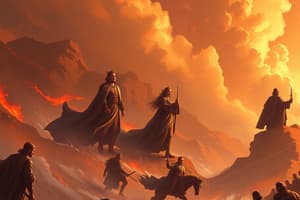Podcast
Questions and Answers
What is the definition of power?
What is the definition of power?
Power is having others act as you would have them act.
Which of the following is NOT a base of power?
Which of the following is NOT a base of power?
- Money
- Authority
- Charisma
- Wisdom (correct)
What does James Madison define politics as?
What does James Madison define politics as?
The pursuit of one’s interests.
According to David Easton, government is the authoritative allocation of values and resources.
According to David Easton, government is the authoritative allocation of values and resources.
What is a possible government response to citizen demands?
What is a possible government response to citizen demands?
The government is created as a response to __________ conflict.
The government is created as a response to __________ conflict.
What did John Locke believe was the basic object of government?
What did John Locke believe was the basic object of government?
Which philosopher believed that the government must be powerful to guarantee people's safety?
Which philosopher believed that the government must be powerful to guarantee people's safety?
Marx argued that governments were created to protect public property.
Marx argued that governments were created to protect public property.
What term describes a government controlled by a single individual?
What term describes a government controlled by a single individual?
Flashcards are hidden until you start studying
Study Notes
Power Dynamics
- Power influences behavior, compelling individuals or entities to act against their usual inclinations.
- Power can be wielded by various entities: animals, individuals, corporations, and states.
- Bases of power encompass money, authority, knowledge, religion, morality, violence, size and solidarity, charisma, and celebrity.
Understanding Politics
- Politics revolves around the distribution of resources and interests: "Who gets what, when, and how."
- James Madison views politics as the pursuit of personal interests.
- Aristotle describes politics in terms of striving for the Good Society.
- Politics may involve manipulation and influence over people.
Defining Government
- Government serves as a decision-making process, described by David Easton as the authoritative allocation of values and resources.
- Government responds to societal demands by formulating policies: inputs from individuals or groups lead to government outputs and the continuous feedback loop.
- Possible government policy outputs include:
- Neglect: Ignoring or rejecting requests.
- Symbolic policies: Policies that merely appear to address issues.
- Cooptation: Incorporating leadership from demand-driven groups to shape policy.
- Substantive policy: Fulfillment of public demands.
- Political repression: Utilization of forceful tactics to deny policy requests, such as threats or violence.
- System values generally include capitalism, democracy, and constitutionalism.
Origins of Government
- Conflict contributes to the emergence of government:
- Conquest theory suggests government arises from control over conquered societies.
- Social contract theory posits that government forms as a resolution to internal societal conflict, providing structure for securing natural rights (life, liberty, property).
- John Locke emphasizes that government should protect these natural rights, advocating for limited governmental authority.
- Thomas Hobbes argues for a powerful government to ensure safety, stating life in a "state of nature" is dire without authority.
- The founders of the United States favored Locke's limited government approach.
Class Struggle and Government
- Marx theorizes that government exists to safeguard private property.
- The etymology of democracy is derived from Greek terms: "Demos" (people) and "Kratos" (power).
Forms of Government
- Governance structures can vary based on the number of people in control:
- Anarchy: No governance.
- Autocracy: Rule by one.
- Oligarchy: Control by a few.
- Aristocracy: Rule by the best individuals.
- Plutocracy: Control by the wealthy.
- Democracy: Governance by the many.
Democracy Types
- Procedural democracy focuses on decision-making participation.
- Substantive democracy emphasizes the outcomes and quality of participation and policies.
Studying That Suits You
Use AI to generate personalized quizzes and flashcards to suit your learning preferences.




